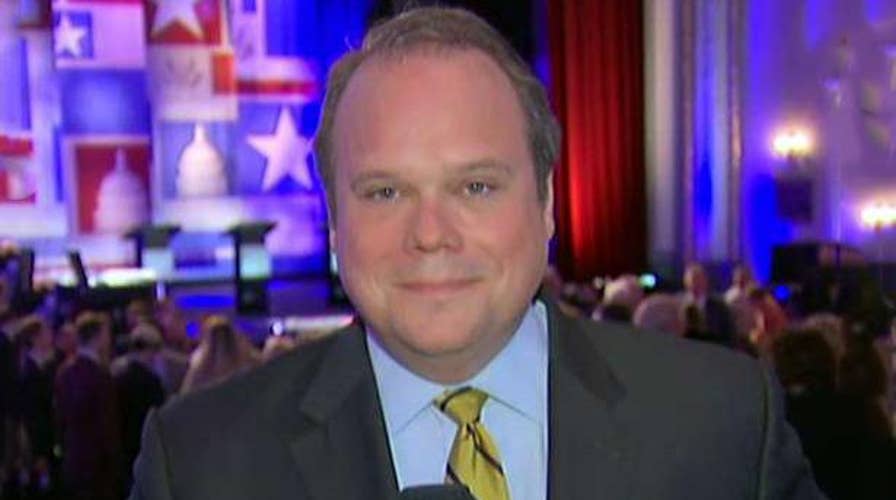Chris Stirewalt recaps West Virginia GOP Senate debate
Fox News politics editor joins 'The Story' with reaction to the West Virginia GOP Senate primary debate.
In Tuesday night’s West Virginia Republican U.S. Senate primary debate, televised on Fox News Channel, Attorney General Patrick Morrisey and U.S. Rep. Evan Jenkins underscored why they are the frontrunners and why they would do a far better job representing the state than Democratic Sen. Joe Manchin.
The GOP candidates face off in a primary May 8 to challenge Manchin, who has shown repeatedly that he is beholden to national Democrats and their far-left agenda of opposition to President Trump at every turn. Former coal executive Don Blankenship is also in the GOP primary, but trails in polls.
President Trump won a 40-point victory in West Virginia over Hillary Clinton in 2016. The Republican candidates made a point of saying they support the president and will help him improve the lives of West Virginians and Americans if they can oust Manchin and help the GOP expand its narrow 51-49 Senate majority in the November election.
Despite wishful thinking by Democrats that they will seize control of the Senate, a win in the West Virginia Senate race could be a sign that Republicans pick up three or four seats in the chamber.
Morrisey and Jenkins wisely stressed their support for President Trump in a state where he is clearly popular. In contrast, Manchin’s first loyalty goes to Senate Minority Leader Chuck Schumer, a New York Democrat whose agenda is about as far from that of West Virginians as you can get.
As voters in my home state cast their ballots, here are three things to watch over the next week.
1. Who turns out to vote?
While unaffiliated voters can vote in the Republican primary in West Virginia, the race for the Senate nomination will be decided by which candidate wins self-identified conservatives and voters over age of 65. These are the two groups who historically turn out in West Virginia Republican primaries. In our recent GOPAC Election Fund poll, Attorney General Morrisey held the edge among conservative voters.
It is also important to look at the Eastern Panhandle of the state. There Berkeley, Jefferson and Morgan counties will have a huge impact on the final results.
In his previous two races for statewide office, Morrisey secured big enough margins in these counties to be victorious. However, the largest number of early votes cast in the primary for the Senate will come from the Charleston-Huntington Media Market. This could be a good sign for Jenkins, since Huntington includes his old state Senate district and the base of his congressional support.
2. Where do the late deciders go?
Both the GOPAC Election Fund and Fox News surveys found a significant number of undecided voters throughout the state. Whichever way they break will be decisive in determining which candidate wins the Republican Senate nomination. There will be plenty of commercials and communications from the candidates in the final week of the campaign and that could have a big impact.
3. Will a Democratic Super PAC, Duty and Country, determine the winner?
In the past two weeks, over $1.2 million has been spent in attack ads against Jenkins by Democratic outside groups. We are now seeing Democrats meddling in Republican primaries and attempting to influence who they will ultimately run against in the general election.
Should Jenkins be defined by these attack ads, this tactic will turn into Page One in the Democrats’ playbook with GOP primaries across the country.
With Manchin’s declining approval rating, Tuesday’s debate puts us one day closer to learning whether he will be a victim of the political environment that has turned against Democrats. West Virginia is a very pro-Trump state, and whoever wins the GOP primary is sure to wage a strong race against Manchin and hopefully send him into a well-deserved retirement

